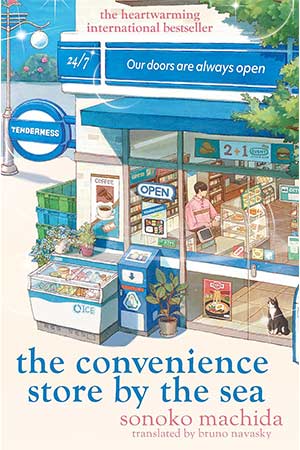Voicing Sonoko Machida’s Convenience Store by the Sea
 Sonoko Machida
Sonoko Machida
The Convenience Store by the Sea
Trans. Bruno Navasky
Narrated by Yuriri Naka
Penguin Audio, 2025
I recently had the pleasure of listening to the newly released audiobook of Sonoko Machida’s The Convenience Store by the Sea, a charming and heartfelt novel that follows the diverse people who shop at and work in a convenience store. Located in the smaller tourist city of Moji-Ku, Kitakyushu, on Kyushu—the southernmost of Japan’s four major islands—the little shop is flush with customers. This success is due not just to the fact that the store, named Tenderness, offers high-quality everyday items but also to the preternatural magnetic charm of the store manager, whose beauty and genuine kindness lead to an official fan club and obsessive customers. Along with him, we meet the amateur mangaka dedicated to humorously documenting his life, the old man who rides around town on his bike and knows everything about everyone, and an assortment of regulars and visitors, all with their own stories to tell and impacted in various ways by the shop and its manager.
The novel offers six loosely connected tales anchored around Tenderness. From episodes focusing on the compromise between one’s dreams and reality, to how tradition and age affect marriage, to teenage romance, The Convenience Store by the Sea crafts a series of touching moments that relate simple pleasures found through the crises of mundane life. Throughout, characters act as the catalysts or bridges necessary for change and reflection. In each chapter, we are placed in the shoes of a character whose everyday habituated repetition is challenged by a minor variation that eventually forces them to face themselves and their circumstances.
Sonoko Machida, here translated by Bruno Navasky, offers up a rich but practical description that takes a photograph more so than paints a picture of each scene. Thus, while each moment in the piece may not contain the same vividness as more poetic prose, the frank and precise language offers a clear impression and proceeds with alacrity. Specifically, the description of food from scene to scene is lively enough that I would not recommend listening to this while hungry, as I did.
Machida’s character work is also laudable. The diverse cast ranges from nearly unrealistic to grounded and true to life. Yet she is able to craft interactions between these different figures without straining credulity any more than necessary. Admittedly, the plot is not all that distinctive. Much like our own everyday lives, events just occur without much setup. But it is clear that an overarching story is not the aim of Convenience Store. Instead, Machida offers us a quilted pattern of incidents stitched together with common threads.
Of course, we must consider another form of translation: the fundamental differences between reading a physical (or digital) book and listening to an audiobook. When we read, we do so at our own pace, relishing each word or rushing headlong as we see fit. This is less the case with an audiobook. Sure, one can speed up or slow down the recording, but doing so strains the intended experience, unlike reading.
The demand on attention also differs. Since we primarily perceive the world through sight, reading requires a certain amount of direct focus, through which it seems information can be directly piped into our minds in the unique way this art medium provides. Audiobooks, on the other hand, are easy to tune out—especially since it is common to listen to them as a background for some other task. However, I find that if I intentionally listen much like I intentionally read, the experience of an audiobook can come close to that of sitting down with a physical book.
While all finished novels are collaborative efforts, oftentimes the editors, copywriters, and other necessary contributors to the work are not brought to the forefront of the audience’s attention. In the case of an audiobook, however, the opposite is, to some degree, true. We interact with the narrator/collaborator more directly than the author themselves—the narrator acts as the avenue through which the story is related. Moreover, the narrator possesses a significant interpretive sway over the actual words themselves. While this is more apparent in how they choose to voice dialogue and characters’ inner thoughts, it is also true in regular prose. The rhythm and intonation a narrator adopts throughout the performance sets the tone for the listener, not unlike the reading of a poem.
Yuriri Naka does an excellent job lending her voice to the story. Her voice distinctively brings life to the diverse cast of characters, performed with a marvelous balance of subtlety and separation. Naka has a way of narrating that brings each scene into sharp focus without the dialogue tending toward an audio drama. In particular, her ability to voice the somewhat mischievous Mitsuri was a joy to experience. It will be difficult for me to imagine a better voice for this novel the next time I decide to pick it up for a read, and I cannot hear the characters in my head except through Naka’s performance.
While it is true that such labels as cozy, quirky, or slice-of-life fiction can be readily applied to The Convenience Store by the Sea, there are deeper themes to be found here than what such characterizations may imply. If you’re looking for a short-story collection that will leave you with a warm smile, I highly recommend listening in. Machida’s most recently translated novel is much like a hot shower: comforting yet still able to produce profound reflections.
University of Oklahoma


